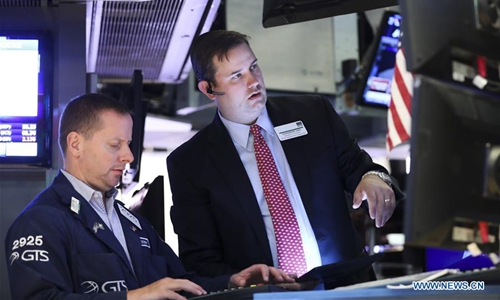US stock market may see another round of turbulence
By Zhang Anyuan Source:Global Times Published: 2020/4/22 23:50:52

File photo
Influenced by epic oil price volatility, main US stock indexes fell about 3 percent Tuesday. Despite regaining ground Wednesday, the market turning bearish after the February slump still faces turbulence under further impact of pandemic.The US stock market's historical trend has basically been in line with the country's economic fundamentals. The latest round of turbulence was triggered by the gloomy economic prospects amid the deadly virus outbreak. The US' unprecedented rescue package eased liquidity and prevented its credit chains from collapsing. Technically, as long as the US Federal Reserve is willing to buy, the current financial crisis will not become desperate.
But the US stock market will not see an easy rebound either, and large fluctuations are very likely to continue. The market has experienced a plunge of about 36 percent from its most recent high and is not likely to rapidly pick up and stay stable, according to general scenarios. Given the recent epic crash in the oil market, the US stock market is far from safe, and the alert will not be easily lifted.
When might the next round of turbulence begin? There are two angles to the question. The first is the seasonable factor. There is an old saying in Wall Street: Sell in May and go away. It is highly likely to be the case this year, especially considering that the US' government's premature reopening of its economy may bring a virus resurgence.
In addition, US economic performance data may turn out to be worse than the already gloomy forecasts, which would deal a severe blow to the already vulnerable stock prices.
The US' current economic support plans mostly aim to avoid loss of liquidity in major industries and for small- and medium-sized enterprises. These policies will not play a significant role in boosting the economy, because the quarantine measures have dealt a severe blow to both supply and demand sides.
After a complete cycle and continued prosperity through large-scale tax cuts, the US economy could fall into a long-term recession due to the pandemic impact. Trump's big and bold idea for infrastructure may be too unrealistic to implement, but the fact that he called for spending of $2 trillion on infrastructure to bolster the economy shows that the US is considering the possibility of a long-term recession, and is preparing plans for it.
Eyeing the economic recovery after the pandemic, China and the US apparently see rising mutual needs. For the US, lifting the tariffs imposed on China would be conducive for its own economic recovery and improvement.
The author is chief economist with China Securities. bizopinion@globaltimes.com.cn
Posted in: EXPERT ASSESSMENT